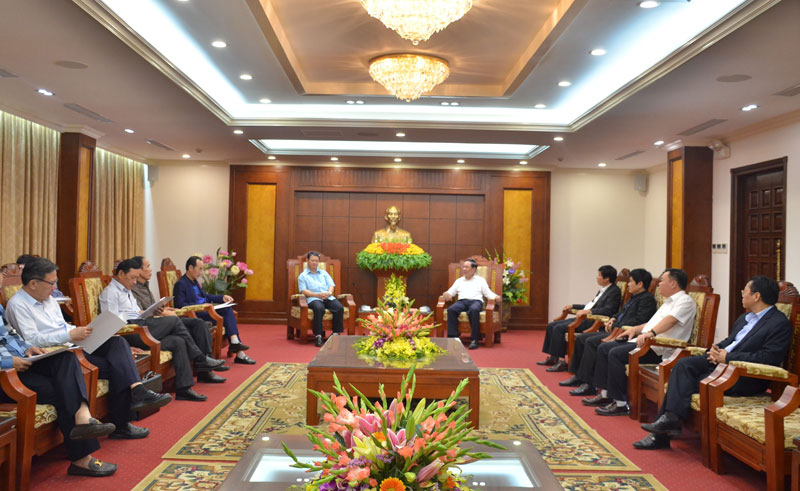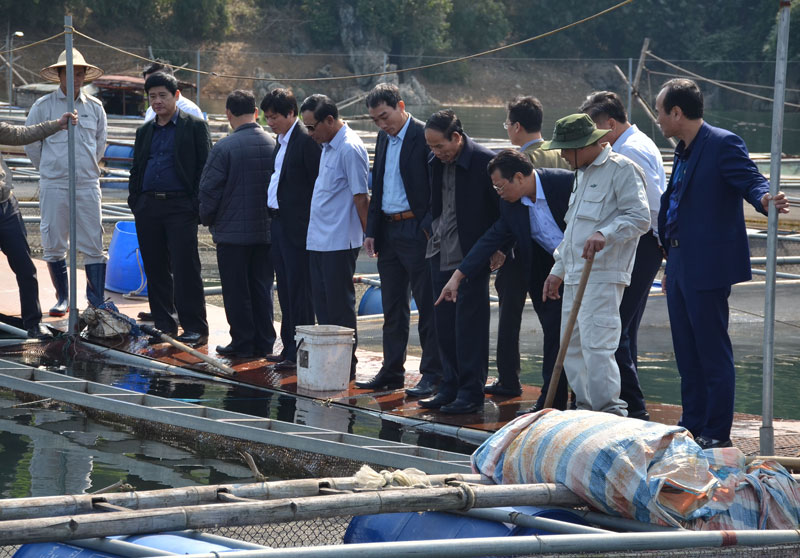
(HBO) – A delegation from Lao Cai province, led by Secretary of the provincial Party Committee and Chairman of the provincial People’s Council Nguyen Van Vinh, paid a working visit to Hoa Binh province on March 9.
The
delegation was welcomed by Secretary of the Hoa Binh Party Committee Bui Van
Tinh, Deputy Secretary of the provincial Party Committee and Chairman of the
provincial People’s Council Tran Dang Ninh, and Vice Chairman of the provincial
People’s Committee Nguyen Van Dung.

Secretary of provincial Party Committee
Bui Van Tinh and local leaders receive the Lao Cai delegation.
Outstanding achievements in socio-economic development of Hoa Binh province
were highlighted at the meeting. Tinh introduced the guests of the province’s typical
economic models and arrangement to streamline local organisation in line with
the spirit of the Resolution 39-NQ/TW.
Hoa Binh province is developing citrus fruit areas in Cao Phong, Kim Boi, Tan
Lac and Lac Thuy districts. Currently, the province is home to 8,600 hectares
of citrus trees, 3,700 hectares of which are set aside for business purpose,
Tinh underlined, adding that the locality has worked to branch out caged fish
breeding on Da River with more than 7,700 tonnes of fish raised in over 4,000
floating cages.
The province has 51 new style rural areas, eight industrial parks housing 442
projects including 30 FDI projects and 2,318 enterprises, he said, noticing
that the province has grasped investors’ interest in tourism and golf course
construction.
Nguyen Van Vinh, for his part, spotlighted Lao Cai’s strengths like local
tourism attracting over 3.5 million tourists and value of imports and exports
reaching over 2.58 billion USD in 2017. The province has over 4,000 busineses
with total registered capital of 60 trillion VND.
Under the Politburo’s Resolution 39-NQ/TW, the province streamlined and
rearranged local apparatus personnel, saving some 70 billion VND in 2017.
Lao Cai province’s working group visited outstanding economic models in Hoa
Binh like orange plantation in Cao Phong district, caged fish breeding on Hoa
Binh lake, Luong Son industrial zone and Hoa Binh hydropower plant.
Leaders from both sides discussed measures to promote cooperation opportunities
between the two localities.
Tran Dang Ninh, Deputy Secretary of the
Hoa Binh Party Committee and Chairman of the provincial People’s Council, and the
Lao Cai delegation group visit the caged fish breeding model on Da River.
The Standing Board of the Hoa Binh provincial Party Committee has agreed in principle on a proposal by the Standing Board of the Party Committee of Hoa Binh city to gather feedback on the city’s 1:2000 zoning plan, which forms part of its broader urban development strategy.
Hoa Binh province has made notable progress in public administration reform and digital government development, with the satisfaction index among citizens and businesses reaching over 84%, according to recent government evaluations.
Thanks to great efforts by local authorities in recent times, the governance and public administration performance of Mai Chau district has been significantly improved.
In the afternoon of June 6, the Party Committee, the People's Council, the People's Committee and the Fatherland Front of Lac Son district solemnly held a meeting to celebrate the 139th anniversary of the district's founding (1886–2025) and the 79th anniversary of the establishment of the district's Party Committee (1946–2025). There was the attendance of Mr. Bui Van Thang, the Vice Chairman of the Provincial People's Council; Mr. Quach Tat Liem, the Vice Chairman of the Provincial People's Committee; Ms. Dang Bich Ngoc, the Deputy Head of the National Assembly Delegation of the province; as well as the former leaders of the province and district through various periods, who are the natives of the district.
Implementing the Politburo’s Resolution No. 57-NQ/TW on breakthroughs in science – technology, innovation, and digital transformation is a golden opportunity for the northern mountainous province of Hoa Binh to renew growth model, improve competitive edge and shorten digital gap.
Resolution 57-NQ/TW, issued by the Politburo on December 22, 2024, identifies sci-tech, innovation, and digital transformation as strategic breakthroughs to build a developed and prosperous nation. In Hoa Binh province, this spirit is not just a slogan, it’s being put into action through concrete initiatives that form a "new development triangle”: digital citizenship, digital economy, and digital administration.




